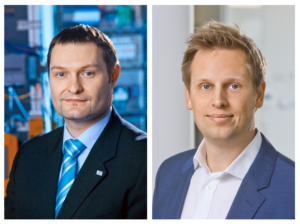Recent Research Trends in Engineering and Validating Cyber-Physical Energy Systems
Tuesday, 29 June 2021 2:00 PM CET (8:00 AM EST)
By Thomas I. Strasser (AIT Austrian Institute of Technology and TU Wien, Vienna, Austria) and Filip Pröstl Andrén (AIT Austrian Institute of Technology, Vienna, Austria)

Register now using the link below:
https://attendee.gotowebinar.com/register/5052430066979702029
Abstract:
A driving force for the realization of a sustainable energy supply is the integration of renewable energy resources. Due to their stochastic generation behaviour, energy utilities are confronted with a more complex operation of the underlying power grids. Additionally, due to technology developments, controllable loads, integration with other energy sources, changing regulatory rules, and the market liberalization, the system’s operation needs adaptation. Proper operational concepts and intelligent automation provide the basis to turn the existing power system into an intelligent entity, a cyber-physical energy system. The electric energy system is therefore moving from a single system to a system of systems. While reaping the benefits with new intelligent behaviours, it is expected that system-level developments, architectural concepts, advanced automation and control as well as the validation and testing will play a significantly larger role in realizing future solutions and technologies. The implementation and deployment of these complex systems of systems are associated with increasing engineering complexity resulting also in increased engineering costs. Proper engineering and validation approaches and tools are partly missing until now. Therefore, this webinar discusses and summarizes the main needs and requirements as well as the status quo in research and development related to the engineering and validation of cyber-physical energy systems. Also, validation examples and short demos are presented. Finally, research trends and necessary future activities are outlined.
Presenters’ bio:
Dr. Thomas Strasser received a master’s and a PhD degree from Vienna University of Technology (TU Wien) and was awarded with the venia docendi (habilitation) in the field of automation from the same university. For several years, he has been a senior scientist in the Center for Energy of the AIT Austrian Institute of Technology. His main responsibilities involve strategic development of smart grid automation and validation research projects and mentoring/supervising junior scientists and PhD candidates. He is active as a senior lecturer (Privatdozent) at the Vienna University of Technology.
He is the co-author of more than 200 scientific publications (journal publications, book editorials and chapters, conference papers, editorial of conference proceedings, technical reports) as well as two patents in the above-mentioned areas. Thomas Strasser has presented results of his research work in various international conferences, workshops, events, and seminars. He is an active member in various program committees of scientific conferences and he serves as an associate editor/editorial board member of IEEE, Hindawi, MDPI and Springer journals.
Dr. Strasser was and is involved since almost two decades in various national and international research projects in various roles (coordinator, WP leader, principal investigator, researcher). In addition, he is an evaluator of research proposals and projects for several national and European funding agencies. He is member of international IEC and IEEE standardization working groups and senior member of IEEE where he is also involved in different activities of IES (AdCom member-at-large 2018-2020, Energy TC Cluster Delegate to AdCom 2020-2021), SMCS (BoG member-at-large 2018-2020, VP for Systems Science & Engineering 2021-2022), PES, IEEE AT Section (secretary 2015-2017, vice chair 2020, chair 2021-2022) and SYSC (SMCS representative and AdCom member 2021-2022). He serves also as the Austrian representative in the CIGRE study committee C6 on active distribution grids.
Dr. Filip Pröstl Andrén studied Applied Physics and Electrical Engineering at Linköping University in Sweden where he received a master’s degree in 2009. In 2018 he received his PhD in Computer Science at Vienna University of Technology (TU Wien) on the topic of model-driven engineering for smart grids. Since 2009 he has been working as a scientist at AIT Austrian Institute of Technology in the Center for Energy. He is specialized on smart grids and is working with control and information systems, power utility automation, and model-driven engineering.

